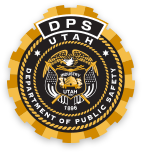Native American Conflict
In 1952, the Sheriff of San Juan County called for assistance with an Indian uprising. One of the first officers to respond was Trooper C. Melvin Brown. Sheriff Tully advised Trooper Brown that the Indians were organizing a “big sing.” It was feared that alcohol was being transported to the sing and a roadblock was set up by Sheriff Tully and Trooper Brown.
Upon checking one vehicle loaded with Indians, Trooper Brown found a case of wine in the trunk. Trooper Brown ordered the Indians out of the vehicle. As they exited, two Indians bolted and ran. Trooper Brown drew his weapon and fired into the air, but the fleeing Indians just ran faster. Within minutes, a large congregation of Indians surrounded Sheriff Tully and Trooper Brown. They became disgruntled that the officers had detained the Indians and began to threaten Tully and Brown. Sheriff Tully understood that stopping Indians on their way to a sing was the same as standing in front of a church and telling people they could not worship. After the wine was confiscated, the Indians were allowed to continue to the sing.
The sing continued for three days and included dancing, chanting, and the formation of a war party. Reinforcements soon arrived from around the state. Colonel Dudler directed Sergeants Jack Gridley, Nick Thomas, Jack Sullivan, and Sam Hatch to organize the troopers into squads. Stationed in Bluff, these officers could clearly hear Indian drums several miles away. Since there was only one hotel in Bluff, most troopers were required to sleep on their patrol blankets on the ground or in their patrol cars. The Indians were singing about the arrival of the Utah Highway Patrol. The Indians classified the troopers as Cavalry. The Indian songs called them “Dangerous Soldiers.”
A Catholic Priest named Father LaBelle was stationed at the local mission and had lived with the Indians for years. Father LaBelle knew the reason why the Indians were on the “war path.” In treaties signed during the 1800s, it was agreed that land north of the San Juan River was the white man’s and land south of the San Juan River belonged to the Indian’s. Several white men had used heavy equipment to divert the river approximately 1/2 mile. Once the troopers learned what the dispute was over, they ordered the white men to move the river back to where it originally was.
Soon the uprising was over. The Indians continued the sing, praising the Utah Highway Patrol – Cavalry. Troopers were then called “Good Soldiers” in these Indian songs.
